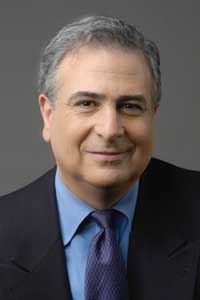- When you say you did the work yourself, you actually did it.
- When you rely on other people’s work, you cite it. When you use their words, you quote them openly and accurately, and you cite them, too.
- When you present research materials, you present them fairly and truthfully. This is true whether the research involves data, documents or the writings of other scholars.
Lipson authors student guide on honesty in academic work
By William HarmsNews Office
 Charles Lipson | |
College students throughout the country have a new book to add to their collections of dictionaries and other essential reference materials—the first-ever guide to avoiding cheating and plagiarism. The guide focuses considerable attention on Web-based research, where much of today’s troubles begin.
“Although most students are honest, colleges across the country see an emerging crisis. There is simply more cheating and plagiarism today than in the past,” said Charles Lipson, Professor in Political Science and author of Doing Honest Work in College: How to Prepare Citations, Avoid Plagiarism, and Achieve Real Academic Success, published by the University Press.
“Many of the problems can be traced to larger classes, where students don’t receive individual attention, and to misuse of the Internet. Students who want to cut corners can download answers to exams or secretly copy material for their papers,” he explained. Their professors, he said, use the same tools to catch plagiarism and cheating.
Unfortunately, there have been more and more violators. Surveys consistently show that cheating among college students is rising. For instance, while 10 percent of students said in 1999 they cut and pasted unattributed material directly from the Internet into their papers, the percentage rose to 41 percent in 2001, according to the Center for Academic Integrity at Duke University. Another survey found that a third of students admitted to cheating on tests.
Lipson has dealt with many of these issues personally. He has taught popular classes at the University for more than 25 years and now directs the University’s undergraduate program in Political Science. After advising many graduates and undergraduates about academic honesty, he decided to write a book designed to help the vast majority of students who want to do honest work.
“Like all professors, I see cases of cheating or plagiarism occasionally. Every one of them is painful. I also see students who want to do the right thing but aren’t quite sure how to cite their sources or how to complete a take-home exam,” Lipson said. His brief reference book aims to reduce the problem by providing clear, consistent rules and explaining why they are so important. According to Lipson, “Sticking to these rules not only helps students learn while they are in college; it prepares them for a lifetime of honest endeavors.”
There are three essential principles for academic honesty:
Lipson shows how these principles work in classes, exams, science labs and research paper assignments. He also provides learning tips, including better note-taking methods and accurate citations for original sources.
“Some honest writers find themselves in hot water, accused of plagiarism because their notes are so bad they cannot tell what they copied and what they wrote themselves,” he said. For clear notes, he suggests writing a Q with a page number at the beginning of a quote and putting another Q at the end, rather than using quote marks, which are easily overlooked.
He also provides suggestions for working honestly in small groups, such as knowing a professor’s expectations of how much work the group should complete and how much should be done individually. “If you are unsure, ask,” said Lipson. And conducting laboratory research requires the investigator to present the experimental results honestly, even if they contradict the original hypothesis.
Ultimately, students who do honest work simply learn more, Lipson pointed out. Students who cheat on practice problems in math or economics will not be prepared for tests on those topics. Students who copy the answers to weekly drills in Spanish or Arabic will never learn the language. Students who plagiarize short papers will not develop the skills they need to write longer research papers. There is a common theme here, he said. “Honest work is the path to real learning.”
According to Lipson, the same basic principles apply to faculty as well as students. “Everyone in the university, from the youngest freshman to the most senior professor, is bound by the same standards of academic honesty,” he said.
The book is widely available in campus bookstores across the country. The University ordered 1,300 copies, which were given to incoming College first-year students during the first two weeks of the quarter in their Humanities core courses.
“We strive to treat our students as young scholars from their first day in the College, and we want them to learn the habits and practices of good research and scholarship at the outset of their careers,” said John Boyer, Dean of the College and the Martin A. Ryerson Distinguished Service Professor in History.
“It is wonderful to have a resource like this from one of our own faculty members. It is a book that helps students learn the mechanical and stylistic aspects of using sources, and which also places those skills within the broader context of the search for knowledge and the life of learning. I am delighted to have the chance to provide Charles Lipson’s rich and useful book to our students.”
![[Chronicle]](/images/sidebar_header_oct06.gif)